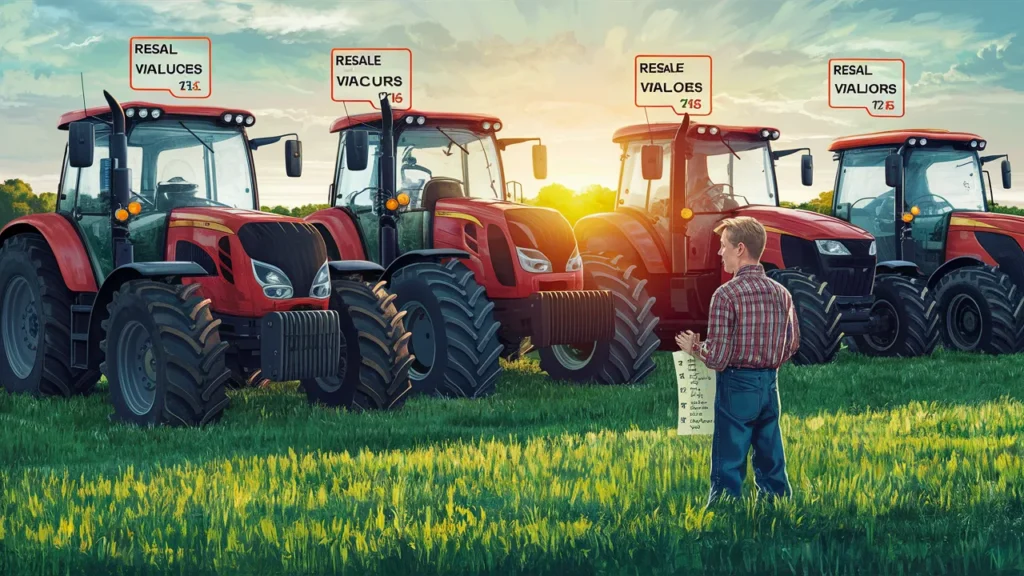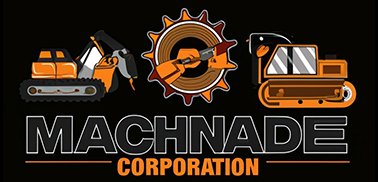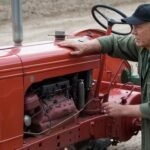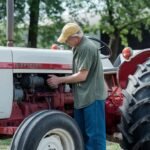In the realm of agricultural machinery procurement, the multifaceted decision-making process is meticulously shaped by an array of considerations, each playing a pivotal role in determining long-term financial viability. Among these deliberations, one often underestimated yet undeniably crucial factor stands out: resale values.
As farmers and industry professionals navigate the labyrinthine landscape of tractor selection, weighing the initial outlay against prospective returns becomes paramount in safeguarding economic sustainability within the agriculture sector.
The significance of resale values extends far beyond mere transactional aspects; it serves as a compass guiding stakeholders towards informed choices that promise enduring benefits and mitigate fiscal uncertainties.
Delving into the intricacies of how resale values reverberate throughout the agriculture industry illuminates a nuanced relationship between acquisition costs and overarching ownership expenses. Beyond being markers of an asset’s worth at trade-in or sale, these figures encapsulate a narrative of reliability, durability, and market adaptability intrinsic to every tractor model.
By scrutinizing this facet through a highly specialized lens, we unravel a tapestry where prudent investment strategies interlace with pragmatic operational foresight—reshaping conventional paradigms governing equipment procurement dynamics.
\In essence, recognizing resale values as not just numeric indices but as barometers of long-term ownership costs unveils a comprehensive framework for optimizing resource allocation and maximizing return on investment in an ever-evolving agricultural milieu.
Factors Influencing Resale Values.
When contemplating the resale value of a tractor, several key factors come into play. One critical aspect is brand reputation; established brands known for quality manufacturing and durability often command higher resale prices due to perceived reliability by buyers.
For instance, a tractor from a renowned brand with a history of producing long-lasting agricultural machinery may retain its value better than lesser-known competitors. Additionally, the maintenance history of a tractor significantly influences its resale value. Tractors with well-documented service records showcasing regular maintenance tend to be more attractive in the used equipment market as they signal proper care and potential longevity.

Market trends and technological advancements also play a significant role in determining the depreciation rates of different tractor models. As new technologies are introduced, older models may depreciate faster as consumers seek advanced features for improved efficiency and productivity.
For example, tractors equipped with precision farming technologies or automation capabilities may hold their value better over time compared to basic models without these enhancements. Understanding market dynamics and predicting future trends can aid in selecting a tractor with features that align with upcoming demands, thereby safeguarding its resale worth.
Certain features or upgrades can have a positive impact on a tractor’s resale value over time. Implements such as loaders, GPS guidance systems, or specialized attachments that enhance the versatility and functionality of the tractor are highly sought after in secondary markets, contributing to increased resale values.
Moreover, investments in upgrades that improve fuel efficiency, reduce emissions, or enhance operator comfort and safety can make a tractor more appealing to prospective buyers seeking modernized equipment. By strategically incorporating valuable features into a tractor during ownership, owners can potentially maximize its resale value when it comes time to sell or trade-in for an upgraded model.
Comparison with Initial Purchase Price.
When farmers are in the market for a new tractor, they often focus on the initial purchase price as a critical factor in decision-making. However, it is equally important to consider how this upfront cost aligns with the potential resale value of the tractor down the road.
While a lower-priced tractor may seem appealing at first glance, its depreciation rate and eventual resale value should be weighed against a higher-priced model with better retained value over time. By taking into account both the immediate cost and long-term financial implications, farmers can make more informed choices that maximize their investment.
For instance, let’s consider two similar tractors from different brands: Tractor A priced lower but known for rapid depreciation versus Tractor B with a higher initial cost but boasting a strong resale value due to its brand reputation and high demand in the used market.

In this scenario, choosing Tractor B may prove to be a wiser investment despite the upfront expense. Farmers who prioritize resale value alongside the initial purchase price can potentially recoup a significant portion of their investment when it comes time to upgrade or sell their equipment.
To strike the right balance between upfront expenditure and future resale benefits, farmers should conduct thorough research on historical depreciation rates of various models, consult industry experts for insights on market trends impacting resale values, and leverage tools that facilitate comparisons between purchase prices and estimated future valuations.
By understanding the trade-off between immediate costs and potential returns through resale, farmers can optimize their financial outcomes and secure greater stability in their equipment investments over time.
Resale Value Prediction Methods.
When evaluating a tractor’s resale value, it is essential to employ diverse methodologies that provide accurate estimations for future transactions. Market analysis tools play a crucial role in predicting the potential depreciation of tractors over time.
By analyzing market trends, demand variations, and competitor pricing strategies, industry professionals can make informed decisions on when to sell or upgrade their equipment for maximum returns. Moreover, historical data evaluation offers valuable insights into how specific tractor models have retained or lost value in the past, guiding prospective buyers and sellers in strategizing their financial moves effectively.
Predictive modeling stands out as a robust technique for estimating a tractor’s resale value with precision. By considering key variables like usage hours and maintenance schedules, predictive analytics can forecast depreciation rates accurately, aiding farmers and businesses in understanding the long-term financial implications of their equipment investments.
For instance, a tractor with high usage hours but consistent maintenance records may hold better resale value compared to a lower-hour machine with irregular servicing histories. Through advanced data analytics, stakeholders can navigate the complexities of resale valuation more confidently.

To exemplify the practical application of predictive analytics in forecasting tractor resale values, consider the case study of FarmTech Solutions. By implementing predictive modeling based on comprehensive maintenance data and historical market trends, FarmTech accurately projected the expected depreciation rates of its tractor fleet over five years.
This proactive approach enabled them to optimize their purchasing decisions by prioritizing models with higher residual worth and planning strategic trade-in cycles to maximize their equipment investment returns. Such success stories highlight the tangible benefits of leveraging predictive analytics in managing tractor assets efficiently while enhancing overall profitability in the agriculture sector.
Long-Term Ownership Benefits.
Considering resale values when choosing a tractor model offers farmers and agriculture industry professionals numerous long-term ownership benefits. One significant advantage is the potential for lower total cost of ownership over the lifespan of the equipment.
By selecting a tractor with a strong resale value, owners can offset initial costs through higher returns in the future when they decide to sell or upgrade their machinery. This approach allows them to optimize their financial resources and reinvest in newer, more efficient models as needed.
Strategic resale planning plays a pivotal role in realizing cost savings throughout the ownership cycle of a tractor. By anticipating market trends, understanding depreciation rates, and leveraging high-value features that retain their worth in secondary markets, owners can maximize their returns when it comes time to resell.
For instance, investing in popular add-on technologies or durable components that tend to hold value well can enhance the overall appeal and resale potential of a tractor within the competitive second-hand market.
To capitalize on these advantages, farmers and industry professionals are encouraged to integrate robust resale strategies into their equipment procurement decisions. This entails conducting thorough research on historical resale data, staying informed about changing market dynamics, and aligning purchasing choices with long-term financial goals.
By factoring in not just immediate needs but also future asset value considerations, individuals can position themselves for improved profitability and sustainable growth in the agriculture sector.
Market Dynamics and Global Trends.
The resale value of tractors is not isolated from the broader context of market dynamics and global trends in the agriculture industry. Regional differences in demand patterns significantly impact which tractor brands or configurations hold their value over time.
For instance, in regions where large-scale farming operations are prevalent, tractors known for their durability and high horsepower may command higher resale values due to strong demand from commercial farmers looking for reliable workhorses to handle substantial acreage efficiently.
On the other hand, areas with a concentration of smallholder farmers might see compact utility tractors with versatile features retaining better residual worth as they cater to the diverse needs of smaller agricultural operations.
As sustainable agriculture practices gain traction worldwide, there is a noticeable shift towards eco-friendly farming equipment, including tractors. Emerging global trends underscore a growing preference for environmentally conscious machinery that reduces carbon footprint and promotes resource efficiency.

This trend towards sustainability not only influences purchasing decisions but also impacts the perceived value of tractors on the secondary market. Eco-friendly tractors equipped with advanced emission control technologies or hybrid power systems are likely to witness higher demand and better resale values as consumers prioritize sustainability along with operational performance.
Furthermore, consumer behavior in the agriculture machinery sector is evolving towards favoring environmentally friendly solutions that align with sustainable farming practices. This shift in mindset is projected to trigger fluctuations in traditional resale valuation criteria as buyers increasingly factor in environmental considerations when assessing the long-term worth of a tractor model.
As a result, manufacturers focusing on developing innovative features like precision agriculture technology or autonomous capabilities aimed at reducing environmental impact can anticipate a positive correlation between these advancements and enhanced resale values in response to evolving market preferences for sustainable agricultural solutions.
By staying attuned to market dynamics and global trends driving the demand for eco-conscious farm machinery, tractor buyers can make informed decisions that not only benefit their operations but also position them strategically in an evolving marketplace focused on sustainability.
Conclusion: The Role of Resale Values in Tractor Selection.
In conclusion, the resale value of a tractor plays a crucial role in the decision-making process for farmers, agriculture industry professionals, and tractor buyers. By understanding the factors that influence resale values, comparing them with initial purchase prices, predicting future depreciation rates, and considering long-term ownership benefits, stakeholders can make informed choices that optimize financial outcomes.
Resale values serve as key indicators of a tractor’s overall cost-effectiveness over its lifecycle and should be integrated strategically into equipment procurement strategies.
As the agriculture sector continues to evolve with technological advancements and shifting market dynamics, assessing the resale potential of tractors becomes increasingly essential for sustainable farming practices and improved profitability.
By staying abreast of global trends that prioritize sustainability and environmental consciousness, individuals involved in tractor selection can align their decisions with emerging preferences and enhance their competitive edge.
Harnessing the power of resale values as a guiding metric in tractor acquisitions can lead to smarter investments, lower total cost of ownership, and enhanced returns on investment in an ever-changing agricultural landscape.









